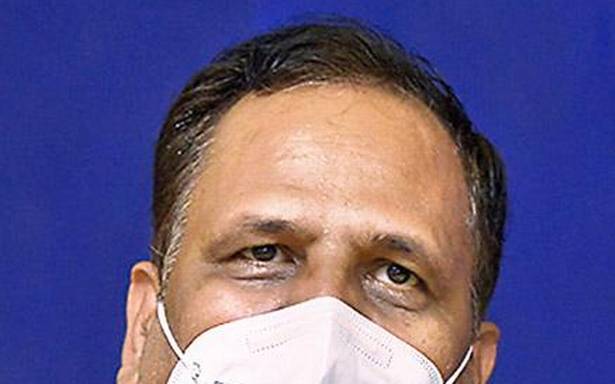Mr. Jain said more than 80% of the samples sent for genome sequencing during the second wave and thereafter showed the presence of the Delta variant
Health Minister Satyendar Jain on Tuesday said Delhi has already overcome the Delta variant of coronavirus detected in over 80% of Covid samples sent for genome sequencing during the second wave of the pandemic and thereafter.
The minister told reporters the Centre has not yet asked for data on deaths due to shortage of oxygen and that a new sero survey will be undertaken in the city soon.
The first sero survey conducted in June-end last year found Covid antibodies in 22.6% of the samples. The number increased to 29.1% in August and then dropped to 25.1% in September. In October, it went up to 25.5%. The January round of the survey found antibodies in 56.13% of people screened.
Mr. Jain said more than 80% of the samples sent for genome sequencing during the second wave and thereafter showed the presence of the Delta variant.
“Since the Delta variant originated in India, we have already faced the wrath of this variant during the second wave. Other countries need to prepare themselves as it is spreading there.
“Delhi has already battled and overcome the Delta variant wave. The ICMR has also pointed out that Delhi was battling the Delta variant during the second wave. Therefore, I don’t think that it should be a cause of concern for us anymore,” he said.
The health minister said the Delhi government is preparing 37,000 beds, including 12,000 ICU beds, in anticipation of a third wave of coronavirus.
In the last wave, the city government had prepared around 23,000 beds, of which 6,000 were ICU beds.
The Delhi government has also started a ‘Graded Response System’ under which restrictive measures will be taken according to test positivity rate.
The system, prepared along the lines of a similar mechanism to fight air pollution during winter months, was drafted by an expert committee appointed by the Delhi government.
Yellow, amber, orange and red alerts will be issued as the positivity rate increases.
According to the plan, curbs kick in from 0.5% positivity rate.
Private offices, malls, weekly markets and the Delhi Metro will be shut down if TPR rises above 2% and the city will be put under a curfew if the TPR breaches the 5%-mark.
“The first level will be implemented at a positivity rate of 0.5%. The second, third and fourth levels will be activated at a TPR of 1%, 2% and 5%, respectively. Last time, the red level was implemented when we had reached a positivity rate of about 14-15%,” Mr. Jain said.
The minister said though the government has been making preparations keeping children and their health in view, the “overall number of children who need hospitalisation is very less in comparison to the adult population”.


